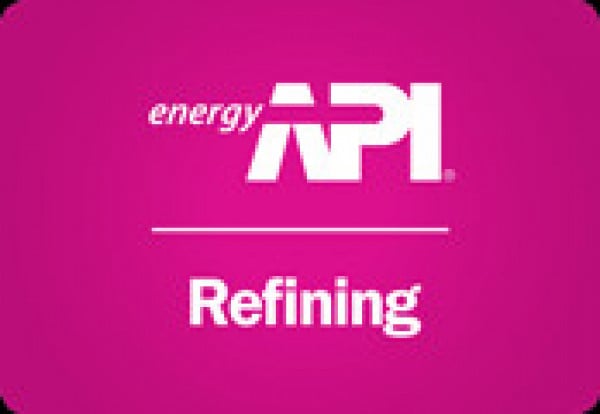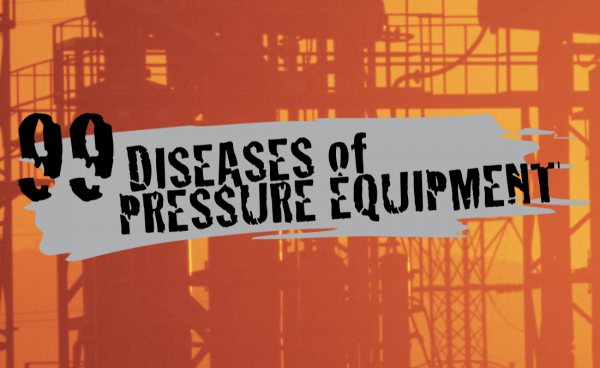API RP 934, Materials and Fabrication of 2 1/4Cr-1Mo, 2 1/4Cr-1Mo-1/4V, 3Cr-1Mo, and 3Cr-1Mo-1/4V Steel Heavy Wall Pressure Vessels for High-temperature, High-pressure Hydrogen Service, is a recommended practice developed and published by the American Petroleum Institute (API). It covers the material and fabrication requirements for heavy wall pressure vessels used in petrochemical plants and refineries to process hydrogen-containing fluids at high temperatures. Specifically those vessels constructed to the standards put forth by the ASME Boiler and Pressure Vessel Code, Section VIII.
API RP 934 is composed of five separate sections: API RP 934 A, C, and E and API TR 934 B and D. Each section covers vessels that are made of different steels or that run in different temperature ranges. These RPs and TPs can be applied when either constructing new vessels or modifying already existing pressure vessels. Along with materials and fabrication, these documents also discuss things like damage mechanisms, proper wall thickness, and weld overlays.
Section A was originally published in December 2000, and the most recent 3rd Edition was released in January of 2019. The current edition of Section C (2nd Ed.) was published in February of 2019, Section E (2nd Ed.) in January 2018, and Sections B and D are both in their 1st Edition from 2011 and 2010.
Related Topics
- API 560 - Fired Heaters for General Refinery Service
- API 579-1/ASME FFS-1 - Fitness-For-Service (FFS)
- API 594 - Check Valves: Flanged, Lug, Wafer, and Butt-Welding
- API 620 - Design and Construction of Large, Welded, Low-Pressure Storage Tanks
- API 650 - Welded Tanks for Oil Storage
- API 660 - Shell-and-Tube Heat Exchangers
- API 661 - Petroleum, Petrochemical, and Natural Gas Industries Air-Cooled Heat Exchangers
- API RP 1160 - Managing System Integrity for Hazardous Liquid Pipelines
- API RP 1173 - Pipeline Safety Management Systems
- API RP 1176 - Assessment and Management of Cracking in Pipelines
- API RP 1188 - Hazardous Liquid Pipeline Facilities Integrity Management
- API RP 538 - Industrial Fired Boilers for General Refinery and Petrochemical Service
- API RP 571 - Damage Mechanisms Affecting Fixed Equipment in the Refining Industry
- API RP 572 - Inspection of Pressure Vessels
- API RP 573 - Inspection of Fired Boilers and Heaters
- API RP 574 - Inspection Practices for Piping System Components
- API RP 575 - Inspection Practices for Atmospheric and Low Pressure Storage Tanks
- API RP 576 - Inspection of Pressure-Relieving Devices
- API RP 577 - Welding Processes, Inspection, and Metallurgy
- API RP 578 - Material Verification for New and Existing Alloy Piping
- API RP 580 - Risk Based Inspection (RBI)
- API RP 581 - Risk Based Inspection Technology
- API RP 583 - Corrosion Under Insulation and Fireproofing
- API RP 584 - Integrity Operating Windows
- API RP 585 - Pressure Equipment Integrity Incident Investigation
- API RP 651 - Cathodic Protection of Aboveground Petroleum Storage Tanks
- API RP 75 - Safety and Environmental Management System for Offshore Operations
- API RP 751 - Safe Operation of Hydrofluoric Acid Alkylation Units
- API RP 754 - Process Safety Performance Indicators for the Refining and Petrochemical Industries
- API RP 939-C - Guidelines for Avoiding Sulfidation (Sulfidic) Corrosion Failures in Oil Refineries
- API RP 941 - Steels for Hydrogen Service at Elevated Temperatures and Pressures
- API RP 970 - Corrosion Control Documents
- API RP 982 - Inspection and Assessment of Refractory Linings
- International Organization for Standardization (ISO)
Relevant Links
- API Standards Homepage
- Purchase Section A
- Purchase Section B
- Purchase Section C
- Purchase Section D
- Purchase Section E
Topic Tools
Share this Topic
Contribute to Definition
We welcome updates to this Integripedia definition from the Inspectioneering community. Click the link below to submit any recommended changes for Inspectioneering's team of editors to review.
Contribute to Definition




















